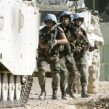
Ankara Promotes Stability in the Middle East
Publication: Eurasia Daily Monitor Volume: 6 Issue: 148
By:

The Turkish parliament approved a governmental motion on June 24 that will extend the mandate for the Turkish peacekeeping force contributing to the U.N. Interim Force in Lebanon (UNIFIL). If the U.N. Security Council decides to extend the UNIFIL’s mandate, the government will be able to keep Turkish forces in Lebanon for one more year, effective from September 5, 2009.
The AKP’s foreign policy has emerged as a new area of contention between the government and the opposition parties. The government’s foreign policy initiatives have encountered strong resistance from the opposition parties in parliament. The main opposition Republican People’s Party (CHP), supported by the Nationalist Movement Party (MHP) and the pro-Kurdish Democratic Society Party (DTP) literally waged a "war of attrition" to prevent the passage of a bill concerning mine clearance on the Turkish-Syrian border. The delayed bill could only be passed after the Prime Minister Erdogan exerted pressure on the deputies from his own party (EDM, May 21). The opposition parties are gathering signatures to appeal to the constitutional court to demand the annulment of the law.
Reflecting its growing involvement in the Middle East, Turkey played an active diplomatic role during the war between Israel and Hezbollah in the summer of 2006, which ended with a U.N. brokered deal. To pacify Lebanon following the Israeli military strikes, the U.N. Security Council redefined the mandate of UNIFIL, originally created in 1978 to supervise Israel’s withdrawal from Lebanon. In 2006, the force was enhanced to undertake additional tasks including monitoring the cessation of hostilities, assisting the Lebanese armed forces in its attempt to expand its authority in southern Lebanon and supporting humanitarian aid operations (www.unifil.unmissions.org).
European nations led by Italy expressed interest in deploying peacekeeping forces to quell the tensions and prevent the spread of conflict in a way that might destabilize the entire region. Given the Turkish army’s experience in U.N. and NATO peacekeeping operations, and Turkey’s ties to both Israel and Arab states, an expectation emerged in the international community that Turkey could also play a central role in this initiative. The participation of Turkey as a Muslim nation was seen as necessary to prevent the impression that the international force was seeking to impose a "Western" plan on Hezbollah. There was even discussion as to whether Turkey should lead the international force to be deployed there, on its own or jointly with France. Although Israel reportedly favored this idea, Hezbollah sources did not welcome it (Yeni Safak, June 25, 2006).
Moreover, at that time Turkish public opinion was strongly opposed to the participation of Turkish soldiers in such a mission. Since this international force was perceived as a measure to contain Hezbollah, there were concerns that the Turkish forces might be forced to engage in armed exchanges with Hezbollah militants, which could have complicated Turkey’s friendly relations with Arab neighbors. Given the growing anti-American and anti-Western sentiments in Turkey at the time, this force was presented as an occupation force acting on behalf of Israel (Yeni Asya, August 14, 2006). Despite this domestic opposition, the government preferred to cooperate with the international community. It carried out a careful risk analysis, and Foreign Minister Abdullah Gul consulted other regional actors and the major political factions in Lebanon to gauge their reaction to Turkish military deployment (Zaman, August 15, 2006; Aksam, September 3, 2006).
As a compromise solution, Turkey agreed to contribute non-combat units to UNIFIL and stressed that it would not participate in the demilitarization of Hezbollah. The Turkish parliament approved the deployment in September 2006, following intense discussions. However, opposition parties voted against the motion, but given its parliamentary majority the AKP was able to obtain the necessary authorization. During these parliamentary discussions, Gul emphasized that Turkey acted in line with the international community and noted that the rules of engagement would not put Turkish soldiers in a position that risked armed skirmishes with local factions. "If the mandate of the UNIFIL deviates from its original mission [to demilitarize Lebanese groups] we will immediately pull out our forces," Gul said (Turkiye, September 6, 2006). The Turkish contingent was dispatched to Lebanon in October 2006 (Sabah, October 12, 2006), and the mandate of the force was renewed in 2007 and 2008. The Turkish Armed Forces contributed patrol boats to the UNIFIL Maritime Task Force and a military engineering company to assist the reconstruction efforts in Lebanon (www.tsk.tr; www.unifil.unmissions.org).
As the current mandate of the Turkish contingent expires, the government forwarded a new motion to parliament seeking an extension. The government pushed to pass this bill through parliament before its one-month recess began on July 1. Though no major disagreements emerged over the contents of the extension bill, the parliamentary discussions highlight the underlying divisions between the AKP and opposition parties in regards to their approaches to the Turkish foreign policy. The AKP views such foreign policy initiatives as an opportunity to harmonize its own regional policies with the preferences of the international community.




